
by Christina Waters | Apr 9, 2018 | Art, Home |
American playwright Thornton Wilder won a Pulitzer Prize for his finely-tuned masterpiece, Our Town. First produced in 1938—on a stage completely bare save for some chairs, two tables, and two ladders—it reveals the gritty, glorious, fuzzy reality of what Edmund Husserl called “lived time.” Not the expansive, beginning-middle-end time of fiction or daydreams. But the mundane, emotionally-troubled, worn time of everyday. The lived time that goes by so barely noticed that we, at least those of us over the age of 40, often find ourselves wondering out loud, “where does the time go?”
Thanks to skilled theater professional Suzanne Sturn, the culturati of Santa Cruz have a chance to remember just how true, unflinching, and humbling Our Town remains. Though most of the people in the opening week’s audiences had very likely seen or read the play in their high school years—like good wine, or almost anything by Shakespeare, this play just gets better, and more disturbingly beautiful with time.
Sturn herself plays the loquacious Stage Manager, the person who introduces the audience to the play, the town—Grovers Corners, New Hampshire—and the era, very early 20th century. With pitch perfect and insider wisdom, Sturn’s Stage Manager introduces us to the key residents of the town, the two families who will be joined together upon the marriage of one son George (Maxwell Bjork), and one daughter (Isabel Cruz). With unerring economy—gestures and vocal work do most of the heavy lifting in this production—Sturn moves the residents of Grovers Corners from early morning, to work and school, home again, and then long into the night.
We meet the milkman Howie Newsome (Chris Rich), the town doctor Dr. Gibbs (Dennis Hungridge), Mrs Gibbs (Susan Forrest) who is Emily’s mother, the town newspaper editor Mr. Webb (Bob Colter), and Mrs. Webb (a terrific Gail Borkowski) who is George’s mom. Everything moves smoothly, almost dreamily from the time when the young people are first discovering each other. The middle section of the play, “Love and Marriage,” deepens the awakening of human needs and desires, and introduces a few more delicious players, the town’s hard-drinking choir mistress (played by Mindy Pedlar), and jolly, philosophical Mrs. Soames (Hannah Eckstein).
In their New World Romeo and Juliet roles, courting each other from the tops of ladders, George and Emily unpeel the pain and awkwardness of youth just managing to reach something like agreement about a future together. It is so familiar, so unexpectedly new, so sparingly written, with absolutely not one word too many. Wilder is a humbling precedent for any emerging playwright.
And the final scene, at the town’s cemetery, delivers everything we know is coming. And yet we’re never quite ready for the last scene of Our Town. Sturn’s production utilizes space and time wisely. The players move up and down the aisles of the tiny theater, bringing their hopes, and ours, with them across the thresholds of mortality and whatever might lie beyond.
“Do any human beings ever realize life while they live it?” Emily asks, speaking for everyone who’s ever lived.
If there is anyone who might, against all odds, not know how the play unfolds, I won’t dwell on the final 30 minutes. It’s a surprise worth getting dressed for. But as I watched the play again, struggling for composure, I found myself watching it through my recent reading of George Saunders’ (another Pulitzer Prize winner) Lincoln in the Bardo. Somehow Wilder and Saunders each understood the Buddhist concept of mindfulness, and the need for those of us alive to be released by those we have loved, and lost. The thin, but ultimate membrane that separates life, death, and eternity.
The play itself is better than I could ever have hoped, or remembered. And this production does it justice, making all the right calls in terms of staging and timing. Kudos to the entire cast and director. Thornton Wilder’s Our Town plays at the Center Stage Theater, 1001 Center St., Santa Cruz through April 22. Rife with the magic of an imagined domain that only live theater can realize, this is a production worth two hours and 15 minutes of your time. And then some. Tickets here.
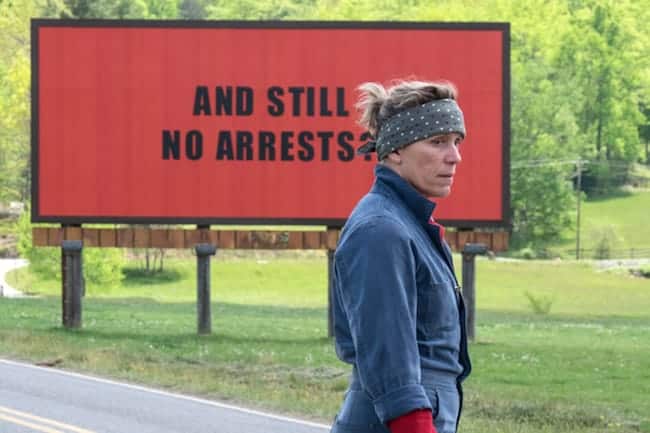
A few words about 3 Billboards
by Christina Waters | Feb 27, 2018 | Home |
Frances McDormand is certainly one of our finest actors. She is incapable of a mediocre or thoughtless performance. And in Three Billboards Outside Ebbing, Missouri she delivers with both barrels, an apt metaphor given the violence of the film.
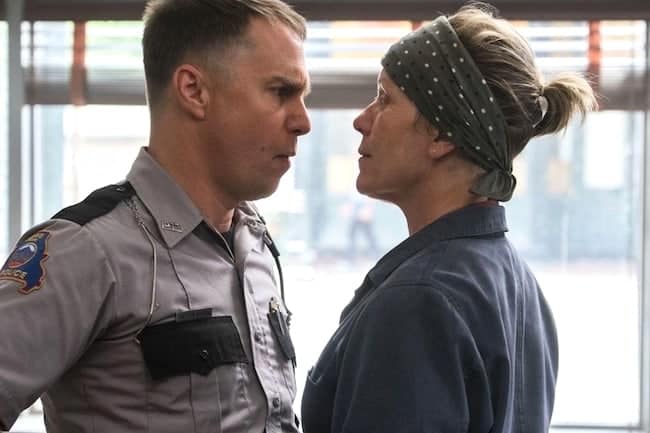
However, she was better in Fargo. She was better in Mississippi Burning. And while she creates an angry working class female hellbent on justice—the distaff equivalent of Charles Bronson’s angry working class male hellbent on justice—I found the character as written and directed by Martin McDonagh, to be a cheap stereotype relying upon expletives to convey depth of rage.
The overload of foul language struck me as way out of line. The point was made early on. We get it. These folks in Ebbing Missouri, from the racist cop Dickson (Sam Rockwell in an Oscar-winning performance) to the loving son of McDormand’s Mildred Hayes (played by Lucas Hedges) all spend a lot of time using the worst words in the Anglo-Saxon vocabulary. The very worst. But is it really necessary for the director to have them using these words in such quantities that we soon realize the F-word, the N-word, and the C-word are standing in for intelligently sculpted scenes of grief, poetic moments of emotion, and soaring diatribes of alienation and outrage?
I was shocked to hear the language a great actor like McDormand was required to spew simply to convince us that finally here was a feminist equivalent to an X-rated Lear.
McDonagh fails to realize this magic realist tale in other ways. It is inexcusably corny. The deer that comes to “visit” the grieving mother at one of the billboards. The scenes with her ex-husband and his new teenage girlfriend. Cinematic Thomas Kinkade. The voice-over we hear from Woody Harrelson’s deceased character, the cop with the heart of gold who dispenses bromides to various characters—redneck deus ex machina. A cheap trick.
Rockwell was pulverizing in a performance that seems to have divided critics and viewers. As the slow-witted, quick-fisted, racist cop who lives with his mom, he is an original creation, one that Rockwell inhabits like a tougher, younger Christian Bale. But there are those who now discredit his Oscar nomination simply because they deplore the character he portrays.
Hey! that’s why it’s called “make-believe.” It’s a movie. A cinematic fable, intended to shine light on the way we live in the real world. Don’t blame the messenger.
And yes, Frances McDormand will probably win the Oscar for her fearless performance.

Pre-Oscar Previews: the Good, the Bad, and the Best
by Christina Waters | Feb 27, 2018 | Home |
 The Good
The Good
I’d have to put Darkest Hour in the “Good” category although in retrospect it really is very very good. Two of the biggest reasons are: Gary Oldman and Winston Churchill. Oldman, in the role of any British actor’s dreams, has done it all (with the help of makeup artistry—he’s learned the speeches, the voice, and the physical gestures, and convinces us that we are actually watching the great and controversial statesman buck the odds, and Parliament, to resist surrendering to the powerful German army and Adolph Hitler.
All that cigar smoke, and the charm of Oldman as the charming Churchill, take us back for a moment into a time that called for heroic action, for courage, and a man who possessed both. A taut, crisp, never-boring, beautifully photographed slice of history. Oldman’s my choice for Best Actor award.
The Bad

Here The Shape of Water, with its manipulative political correctitude, barely edges out the meandering adult fairytale, a study in close-ups, that is Phantom Thread.
1950s London is the center of The high fashion house of dress designer Reynolds Woodcock (Daniel Day Lewis) is placed in 1950s London, where Woodcock, and his sister Cyril (Lesley Manville) dress royals and socialites with their opulent, yet austere creations. Woodcock has plenty of women, but remains a confirmed bachelor until he meets a fierce young working class woman, Alma (Vicky Krieps) who becomes his lover and muse. But not his throwaway plaything. Love is the curse of all artists, and soon Woodcock just cannot cope with the disruptions and distractions of life with Alma, a woman (we’re supposed to believe) that he truly loves. But Alma has plans of her own to subdue the moody dressmaker. Her method of control, of turning her master into her submissive sweetheart, is straight out of the Brothers Grimm. And yet it can’t inject interest, intrigue, or depth into this appropriately superficial study of close-up stitching, rich textile artisanship, and other stunning surfaces that add up to not a hell of a lot.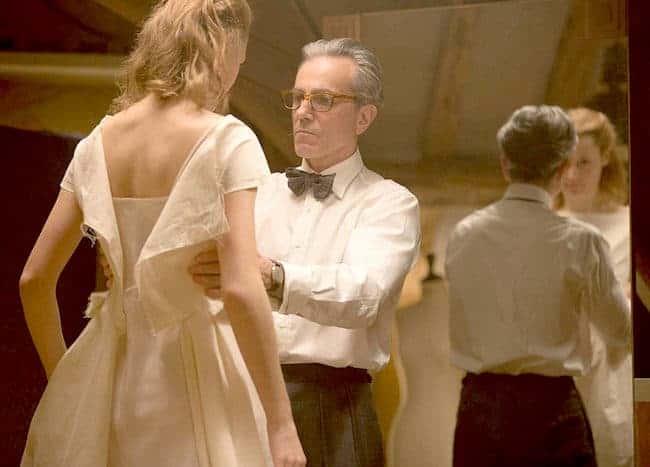
The only reading of this film that provides some possible gravitas to this latest collaboration between Daniel Day Lewis and director Paul Thomas Anderson (who directed Lewis to an Oscar in an equally perplexing film, There Will Be Blood) is one provided to me by a brilliant friend/cultural theorist in San Diego. She reads this film as a text on class confrontation. Alma represents the oppressed working class who finds a clever way to keep her elite lover/employer under her control. Perhaps. But for me, even that tantalizing analysis doesn’t make Phantom Thread into an engaging cinematic artwork.
My other caveat concerns the acting. Even though it sounds sacriligeous, Daniel Day Lewis is not at his best in this, his allegedly final film before he retires from the screen. He appears bored with the work, and scenes in which he and Krieps (who has the most glowing skin surface in cinema) are called upon to argue, fight, and confront each other appear to have been improvised. You can actually watch the two actors fumbling for adequate words of rage. They fail, and the scenes remain unconvincing.
The Best
I’ve got my money on Lady Bird, a tale that’s been told many times before—young girl coming of age, acting out, hates her hometown, feels her parents don’t understand her, wants to head for New york—but rarely this well. So spot on is the writing, directing, and acting that the actors on the screen are all but transparent. They stand back and let the characters reveal themselves. Seamless production in which we are convinced that we’re watching real people in real situations—situations that we’ve all been in: sexual experimentation that is anything but romantic or thrilling; falling for Mr. Wrong; slogging away at pointless jobs in a city far from anywhere; loving our friends more than our siblings; ditching our Real Best Friend for the school’s most popular girl only to find out that she’s a complete loser and our Real Best Friend is the Real Thing.
So good. Just incredibly right on. Dad played by Tracy Letts is the good cop, and mom, the incredibly Laurie Metcalf is the bad cop, in fact mom is the center of Lady Bird’s world, for better or worse.
If there’s any justice in this world—and we all know just how big an “if” that really is—the Oscar for Best Supporting Actress would go to Laurie Metcalf as the edgy, loving, stressed out, picky, nagging, perpetually disappointed mother. A great parent riddled with flaws, worry, and compassion.
Saoirse Ronan as Lady Bird McPherson is the essence of 18-year-old longing, intelligence, and spunk. Lucas Hedges, who made a huge impression in Manchester by the Sea, plays her first boyfriend, then friend, and Timothee Chalamet (Call Me by Your Name) plays a petulant Mr. Wrong, with a sparkling Beanie Feldstein as Lady Bird’s BFF.
The agony and the joy of being young is perfectly etched by director Greta Gerwig, and just possibly SHE will take the Oscar for Best Director.
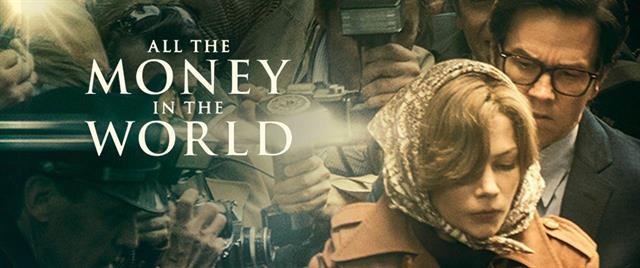
all the money in the world
by Christina Waters | Jan 19, 2018 | Home |
What went wrong here? I wondered as the credits rolled for All the Money in the World. A film made by Ridley Scott, former genius director, current recycler of old ideas, should have been at the least visually entertaining. A film starring Christopher Plummer as the insanely rich and greedy J. Paul Getty, should have offered some serious acting chops. Confession: Kevin Spacey would have been juicy and perfect in the role as the arch capitalist oil man. But you know why Spacey was replaced by Plummer, so that’s the end of that.
Even the always-charismatic Eternal City, Rome, couldn’t manage to inject interest into this languid (i.e. boring) revisitation of the infamous kidnapping of the Getty grand-son in the 70s. The 16 year old hippie (here played by Charlie Plummer) was abducted and held for $17 million ransom. The large sum was nothing compared to Getty the elder’s billions. But he refused to pay. Here’s where things should have quickened and gotten exciting. They didn’t.
In Scott’s curiously vacant hands the scenario just isn’t complex enough to hold 2 hours of cinema.
Also, the vocal work is distracting. I imagine this: Ridley Scott called up the widow of Heath Ledger (Michelle Williams), the always-reliable Mark Wahlberg and (ultimately) the 80something Christopher Plummer. Scott sat Williams and Plummer down in front of a screening of Roman Polanski’s Chinatown. “Study those accents,” he told the two leads, as they watched Faye Dunaway and John Huston.
If you close your eyes during the Ridley Scott film, you’ll hear Faye Dunaway (doing her Katherine Hepburn thing) and John Huston delivering their lines. It is an eerie deja vu.
Then there are the excessive Italian stereotypes, liberally employed to help us hate young Getty’s kidnappers. People in the audience groaned audibly—I was one of them—as the “Italians” fought, danced, drank, laughed, and acted like the shameless, outlaw peasants that they were.
Scott forgot how to edit. He forgot how to motivate actors, and when they did muster some dramatic tension, he forgot how to give his actors lines worth saying.
Even the great Plummer, shaking his head as he examines the day’s stock market numbers, only served to remind me of the great Orson Welles as another financial giant in Citizen Kane.
To paraphrase Lord Acton: money corrupts and all the money in the world, corrupts absolutely.
What a waste of time!
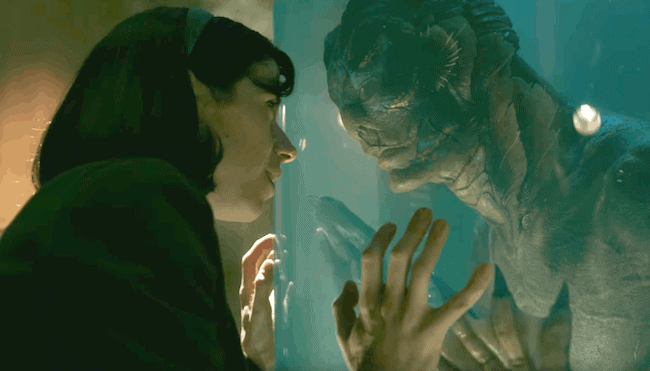
the Shape of Water
by Christina Waters | Jan 15, 2018 | Home |
Pity the poor critic who goes against the tide of public adulation. No one will thank me for not loving the heavy-handed fairy tale, The Shape of Water. No one will thank me for pointing out, against the tide if you will, that the filmmaker Guillermo del Toro, who crafted the uncanny Pan’s Labyrinth, has not repeated his success with this dark tale of forbidden love, cinema history, and diversity casting.
Short version: cross a Hallmark moment with early David Lynch—add scolding, didactic speeches and a minimalist approach to editing—and you get The Shape of Water, a showcase for characters of every gender, ethnicity, and economic background. Gently add a key disability—our heroine is mute—plus an Amazonian swamp creature (for that sexy dash of Otherness), and mix with Cold War clichés and a shocking amount of gratuitous gore and violence, and you either have a film to ride all the way to Oscar triumph…or a mess.
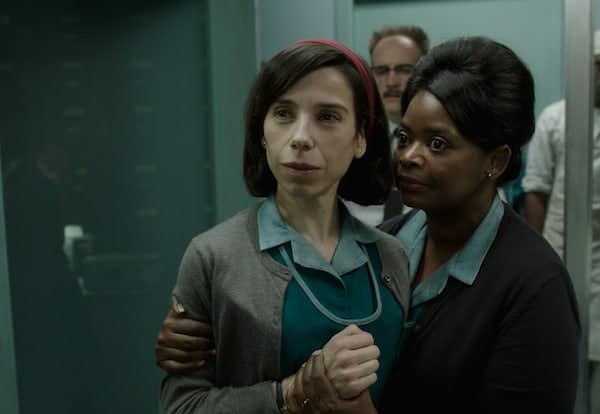
Sally Hawkins and Octavia Spencer in the film THE SHAPE OF WATER. Photo courtesy of Fox Searchlight Pictures. © 2017 Twentieth Century Fox Film Corporation All Rights Reserved
Oh how I wanted to fall in love with this film. So abundant in visual allure, such burnished color, and the irresistible crucible of forbidden love. But then why should it be forbidden? The filmmaker believes that he is not alone in treasuring the fantasy of a cross-species love. And he is not alone here. That much of the film tantalizes all of our tastebuds. It’s how he litters the trail with simplistic bread crumbs that makes, ultimately, for a flow chart of the wrong choices in this exercise in forking paths. (Sincere apologies to Borges.)
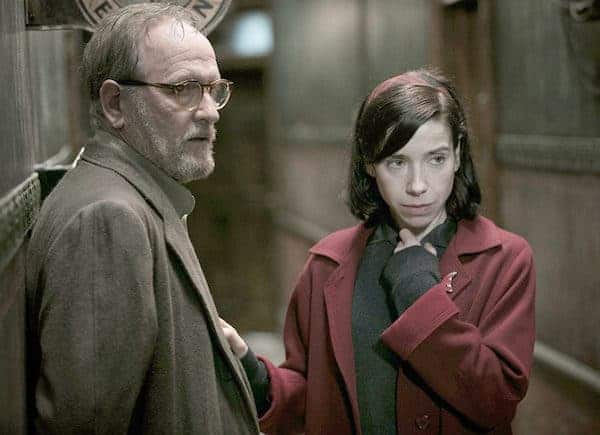 Magic realism, at its best, is a delicious elixir of visual and intellectual desire. But at its worst….let’s just say that at many crucial turns, the film implodes through its own lack of discipline. LIke a spoiled child with an expensive paintbox, del Toro indulges almost all of his fetishes whenever possible. His admirable championing of the oppressed becomes scolding and lecturing. His full rainbow of racial and gender operatives is so contrived and self-congratulatory as to grow tedious.
Magic realism, at its best, is a delicious elixir of visual and intellectual desire. But at its worst….let’s just say that at many crucial turns, the film implodes through its own lack of discipline. LIke a spoiled child with an expensive paintbox, del Toro indulges almost all of his fetishes whenever possible. His admirable championing of the oppressed becomes scolding and lecturing. His full rainbow of racial and gender operatives is so contrived and self-congratulatory as to grow tedious.
I get it: the Other is a real, living, breathing, loveable being with the same feelings, desires, and hopes that we all have. But del Toro works this obvious moral paradigm to death as if he had invented respect for diversity. I was alternately bored and insulted throughout this two hour exercise .
And then there’s the sobering realization that the film itself was growing tedious, just when all the stars have lined up to create a heartbreaking denouement. Speeches are all too long, except the ones that sling stereotypical soundbites like Marie Antoinette tossing cake to the masses.
You know the scenario by now: a loveless mute Eliza, who works nights as a cleaner in a top secret research facility, lives across the hall (above a fading movie palace) from aging, gay, artist Giles (Richard Jenkins). Eliza (Sally Hawkins) has a work buddy, Zelda (Octavia Spencer) with a heart of gold, tons of spunky attitude, and a layabout husband. (So many stereotypes!). Jenkins’ character is given to multiple, redundant soliloquies about the pitfalls of being an aging, gay artist. Yet del Toro has already shown us that well-worn situation quite clearly when Giles is thrown out of his favorite diner by the surly young owner he has a crush on.
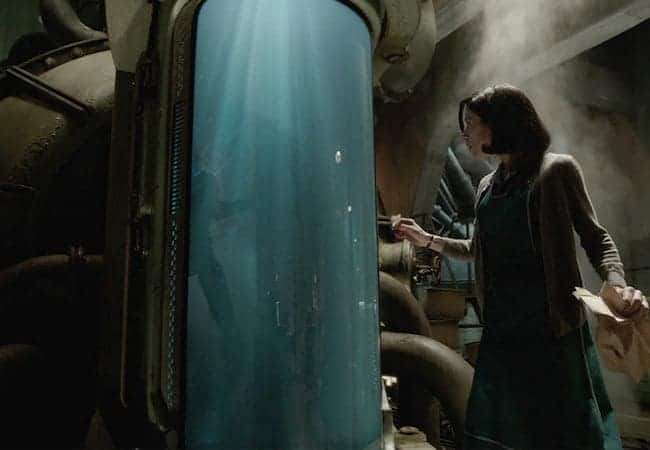 So much talk, talk, talk that could have become shining screen moments if only the lines, and the scenes, had been edited. Instead all the speeches are indulged, as are del Toro’s passion for the golden age of television (Dobey Gillis) and the Busby Berkeley era.
So much talk, talk, talk that could have become shining screen moments if only the lines, and the scenes, had been edited. Instead all the speeches are indulged, as are del Toro’s passion for the golden age of television (Dobey Gillis) and the Busby Berkeley era.
Sally Hawkins is wonderfully watcheable, yet her character doesn’t expand into our hearts. Ditto her work buddy Octavia Spencer who is forced to embody almost every black cleaning woman cliché that has ever seen the light of cinema. Shameless exploitation of the worst cultural models of working women, women of color, people of alternative genders, disabilities, and financial straits—all of this surrounds a central fable in which the ultimate Other is accepted by, and accepts, the yearning Eliza. How lovely this might have been had it not insulted the viewer with its elementary school lesson plan. See? the director says to us slowly and patiently, see how nicely we could all get along?
Two opposing male sexual forces drive the dramatic tension of The Shape of Water. One is the sadistic boss of the research operation—which takes place during the Cold War, hence acres of paranoia and lengthy spy meetings held in Russian. This character, Strickland, played with merciless roughness by Michael Shannon, somehow stands in for the callous, predatory American male of the 1940-50s. Del Toro unleashes him to commit sudden acts of violence—verbal, psychological, and finally physical. Especially toward the amphibious creature, kept chained in a tank of water, that Eliza begins to befriend, and then fall in love with. As sweet as Strickland is harsh, the Creature attracts Eliza, as they glide into an entrancing relationship that quickens when Strickland orders “it” killed for dissection.
Shannon is a powerhouse, as Strickland, and Strickland is a mesmerizing character, but one required to talk and pose, ponder and extol. We tire of him and his violence, long before he can ignite the finale. And the inter-plot, featuring a Russian spy who works at the research facility, and his various spy masters, bogs down rather than adding texture. Del Toro stoops to just about everything, from suburban sex and gangrenous hands, to endless quotes from 50s television. And even—shades of The Artist —the fairytale lovers at one point morph into silver screen performers, twirling and singing their way through a Fred & Gingeresque version of “You’ll Never Know.”
Instead of telling one adult fairytale of true, if magical, love del Toro decided to tell lots of stories all at once. We the audience must choose which strands taste best, and devour them if we want to leave the theater with appetites satisfied. I left hungry.













 Magic realism, at its best, is a delicious elixir of visual and intellectual desire. But at its worst….let’s just say that at many crucial turns, the film implodes through its own lack of discipline. LIke a spoiled child with an expensive paintbox, del Toro indulges almost all of his fetishes whenever possible. His admirable championing of the oppressed becomes scolding and lecturing. His full rainbow of racial and gender operatives is so contrived and self-congratulatory as to grow tedious.
Magic realism, at its best, is a delicious elixir of visual and intellectual desire. But at its worst….let’s just say that at many crucial turns, the film implodes through its own lack of discipline. LIke a spoiled child with an expensive paintbox, del Toro indulges almost all of his fetishes whenever possible. His admirable championing of the oppressed becomes scolding and lecturing. His full rainbow of racial and gender operatives is so contrived and self-congratulatory as to grow tedious. So much talk, talk, talk that could have become shining screen moments if only the lines, and the scenes, had been edited. Instead all the speeches are indulged, as are del Toro’s passion for the golden age of television (Dobey Gillis) and the Busby Berkeley era.
So much talk, talk, talk that could have become shining screen moments if only the lines, and the scenes, had been edited. Instead all the speeches are indulged, as are del Toro’s passion for the golden age of television (Dobey Gillis) and the Busby Berkeley era.
